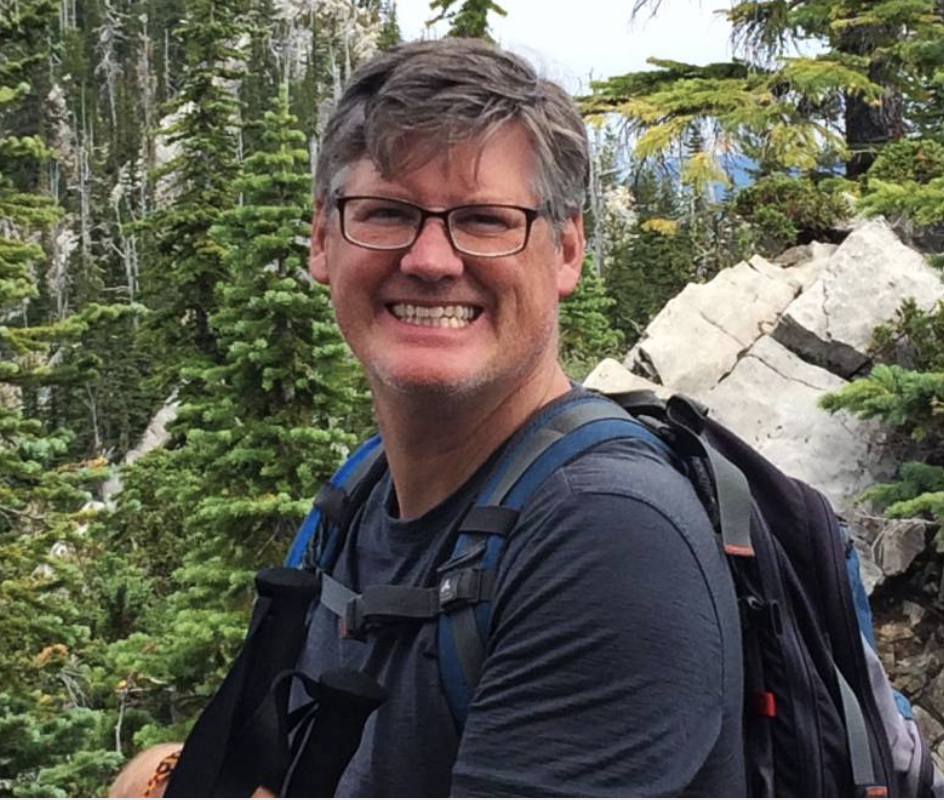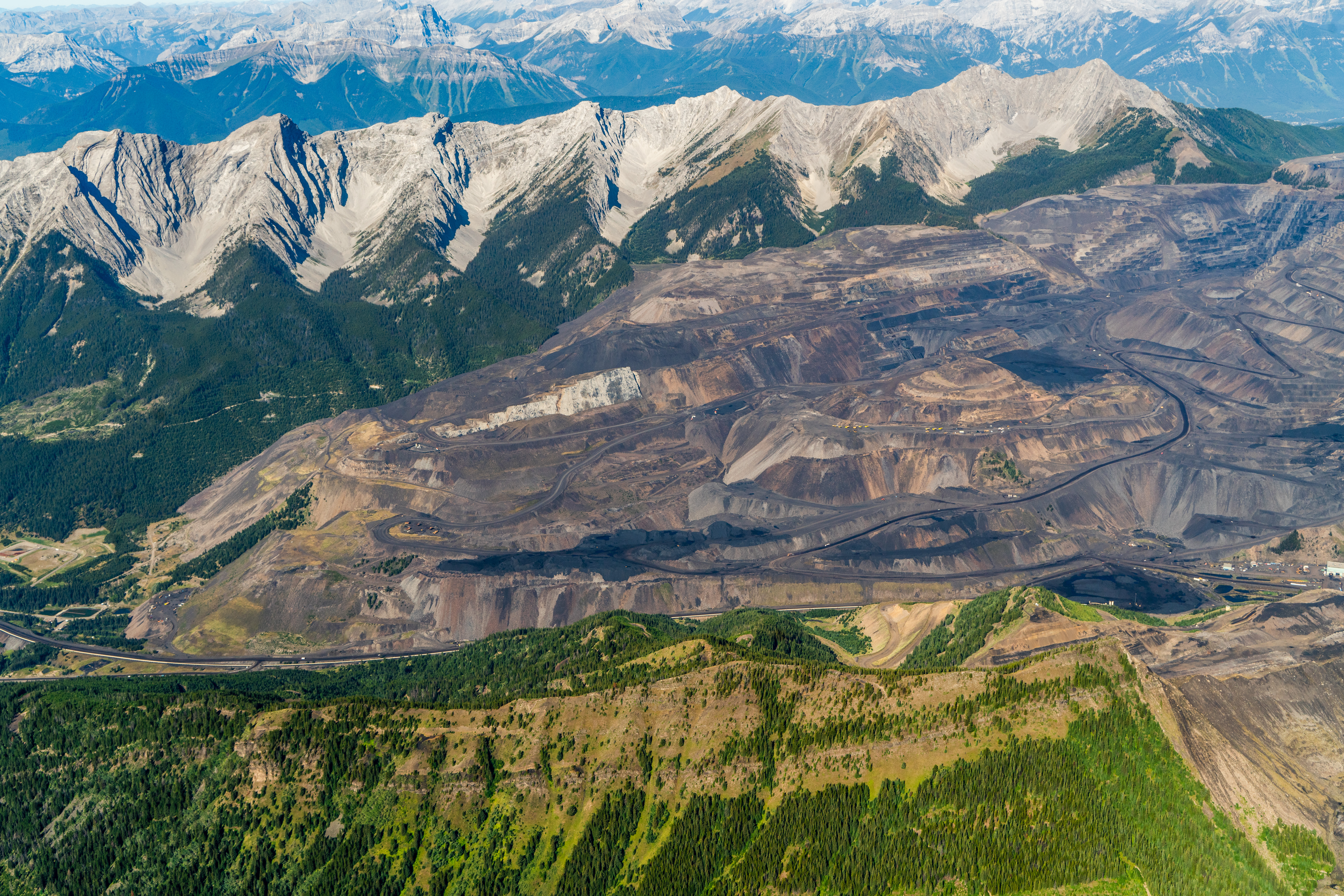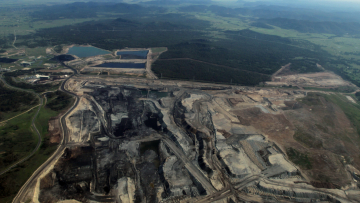Elk Valley in Canada: With money from global banks, Glencore sacrifices entire mountain ranges for coal, polluting the water irreversibly.
Julia Hovenier, Banks and Steel Campaigner, BankTrack

Julia Hovenier, Banks and Steel Campaigner, BankTrack
This frontline story accompanies the Banking on Climate Chaos: Fossil Fuel Finance Report 2024, produced in collaboration with Fossielvrij NL, Wildsight, and BankTrack
“If you caught a fish and you saw that its jaw was misshapen or its gills were missing, would you eat it?” Tom McDonald asks in The New York Times. “Of course not.” The biologist and leader of the Confederated Salish and Kootenai Tribes lives on the Flathead Indian Reservation in northwestern Montana, on the border between Canada and the United States. The vast mountain range is a feast for the eyes, but also the site of five enormous coal mines.
For decades, mining company Teck has been excavating entire mountaintops here, causing serious water pollution and declining fish populations in Ktunaxa/Kootenai First Nation territories and surrounding communities. The Ktunaxa/Kootenai people have led a decade-long effort to hold Teck Resources accountable, which has resulted in international attention and repeated record-breaking fines. He was asked about the impact of coal mining pollution on his life. "It means loss of food, but also more than that," Tom emphasizes, “The water is practically sacred to us. And fishing connects us to our culture and to this place.
As of June 2024, the mines have switched owners to the notoriously controversial Swiss mining giant, Glencore. Its track record on climate and human rights in Colombia, South Africa, and Australia leave the communities in Elk Valley feeling anxious about the future of the mines. Community concerns are increasing due to the fact that Glencore will continue Teck Resources’ plan to expand one of the mines, and continue operating into the 2070s.
As a decades-long environmental struggle has played out in Elk Valley, a long list of banks have neglected to uphold their Indigenous rights, human rights, nature, and climate responsibilities by continuing to finance Teck Resources. Banks continue to do so by financing the mine's new owner, Glencore. In the ownership change, Barclays advised Teck Resources, while Goldman Sachs and Bank of Montreal advised Glencore. Banks like BBVA, Commerzbank, ING, JPMorgan Chase, Mizuho, Morgan Stanley, Standard Chartered, and SMBC have recently entered into long-term financing agreements with Glencore, supporting it to issue a EUR 500 million bond that matures in 2054.

Black snow
For years, the coal mines have been a subject of contention. Representatives of the Ktunaxa Nation, as well as other residents of the area, fishermen, scientists and NGOs, are working hard to remind the mining company and the Canadian government of their responsibilities. One of the leaders is Randal McNair. This energetic fifty-something is the former mayor of Fernie, a fast-growing town in Elk Valley, and now works for the conservation organization Wildsight.
“Fernie was founded in 1898, along with coal mining. The mining started underground, but in the late 1960s they went above ground and whole mountain tops were blasted away with explosives and excavated and dumped into adjacent valleys with giant shovels and trucks. People like to come here for the beautiful scenery, but just down the road there are five mines of Teck.”
The communities close to the mines suffer a lot from dust clouds of coal and rocks, says Randal. “If you drive from Fernie to Sparwood, from a distance you see a huge layer of brown smog over the town. It doesn’t match up: you’re driving between beautiful mountains and suddenly there’s this smog cloud. And when you get closer, you see the mine, the source of that pollution. It covers residents’ cars and houses, you can’t hang your washing outside.”
The pollution is not always immediately noticeable in the beautiful mountain landscape. “When people go skiing here, they first dig a hole in the snow to check how stable it is. When you dig, you often suddenly come across black layers of mine dust. And the rivers here are also beautiful, but appearances can be deceiving: they are polluted with something you cannot see or smell.”
Selenium
One major water pollutant is called selenium. This substance is concentrated in the rocks near the coal seams, and the vast amounts of waste rock created during the mining process leach selenium for decades, or perhaps centuries. Through rain and melting snow, it ends up in the rivers. “If there is too much selenium in a fish’s body,” Randal says, “it affects their fertility. There are not fewer fish because they die, they are simply not born anymore. Some studies estimate the number of fish that are not born at one and a half million a year.”
Teck Resources has done something, says Randal: the mining company paid for water purification here and there, and covers the cost of the bottled water that some residents have been forced to drink for years. “But then you are just putting on band-aids. The main cause is the way Teck mines. There are also methods where you do not dump rock debris in the open air, but pack it so that it comes into less contact with air and water. But yes, dumping is the cheapest.”
Moreover, Teck Resources is constantly trying to tinker with existing legal standards for how much selenium can be in water before it is considered 'polluted'. And the government is noticeably weak-kneed in this regard. A group of scientists warned in 2020 that Teck Resources’ permit allows for discharges of 65 times more hazardous substances than is good for fish populations. Yet another scientist accuses (local) governments of deliberately poor oversight of Teck Resources.
In 2021, Teck Resources was fined a record €40 million for mass fish death in the Fording River. It also pleaded guilty. The judge called the amount “a significant deterrent.” But the mining company, which had a gross profit of €2.7 billion in 2023, still paid up and continued to pollute. “We continue to see the impacts, even more than 100 kilometres downstream from the mines,” wrote Ktunaxa leader Gary Aitken. “We watch our river suffer while regulators stand by and watch.”
With the acquisition being so recent, it is yet to be seen how Glencore will handle the problem of water pollution. Glencore has said it will honour its commitment to continue investments in treatment and other measures to improve water quality. But its global track record leaves communities skeptical.

Banks have a blind spot with metallurgical coal
Out of the 60 banks included in BOCC, 43 have coal exclusion policies, but only two banks would theoretically have to apply this policy to Elk Valley. Why? Because the coal mined in Elk Valley is for steel production, not for power generation. Most banks’ coal policies only apply to thermal coal and do not include metallurgical coal – coal used in the steelmaking processes, which includes higher grade coking coal in addition to other lower grades. The few existing policies for metallurgical coal focus on specific mining projects, and only Société Générale and Lloyds Banking Group exclude companies deriving revenues from metallurgical coal.
The steel industry is responsible for 11% of global CO2 emissions due to its reliance on coal. According to the International Energy Association (IEA), in order to reach the goals of the Paris Agreement, metallurgical coal production will need to fall 90% by 2050. However, none of the Elk Valley mines have a plan to phase down production. In fact, contrary to what is needed, Glencore is also planning to expand its Fording River Mine so that it can continue mining there into the early 2070s. This is in spite of a clear call from the IEA that no new coal mine expansions are needed, as existing mines are sufficient to meet coking coal demand through 2050. By investing in coal mining for steel until 2070, Elk Valley Resources, and its eventual owners, are betting on a fossil steel future that the planet cannot afford. According to an analysis by SteelWatch, continued use of coal in steel making would consume almost a quarter of the planet’s remaining carbon budget for 1.5°C.
Resistance
There are positive developments, however, Ktunaxa Nation, Wildsight and other organizations have been calling for the Canadian and the US Government for more than ten years to take action. They want the IJC, a Canadian-American commission on transboundary issues, to delve into the pollution caused by the mines and come up with solutions. And after all these years, that finally seems to be happening: in March 2024, the two governments commissioned the IJC to investigate and come up with an action plan within two years. Canada tried to get out of the agreement after industrial lobbying. But in the meantime, commissions have been formed, in which representatives of the Ktunaxa Nation are participating.
The Canadian government also seems to be taking a more active role. In July 2024, they laid more charges against Teck Resources for polluting two fish-rich waterways in British Columbia.
If you ask Randal, these developments are not coming a day too soon. “This area in the Rockies is called the crown of the continent. It is one of the most important ecosystems in North America. It has more value than just raw materials. I think we don’t always realize that what’s gone is gone forever. This place needs to be protected.”
What banks must do
Whether it’s being dug up to be burnt in a steel plant, or burnt in a power plant, the impact of coal on communities, nature, and the planet is equally destructive. Banks must immediately end finance for companies expanding all coal mining capacity, like Glencore. In particular, banks should not finance Glencore unless the company:
-
Cancels the Fording River mine expansion project
-
Coordinates and consults with workers, local communities, and the Ktunaxa Nation to develop asset-by-asset just transition plans for the closure of all four mines in Elk Valley, with compensation for decades of pollution they inherited in the sale.


